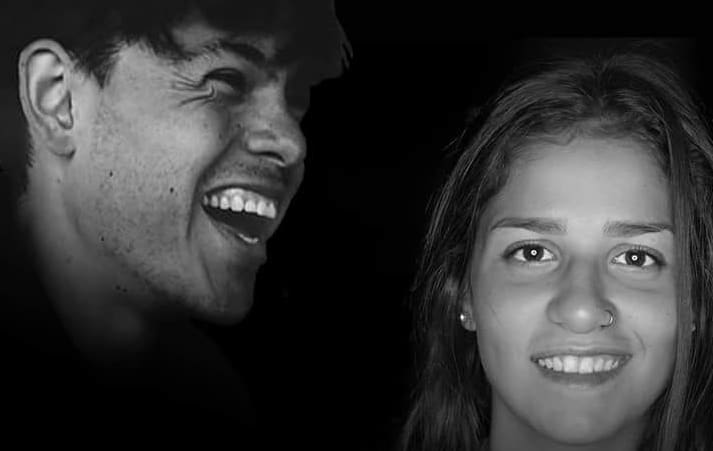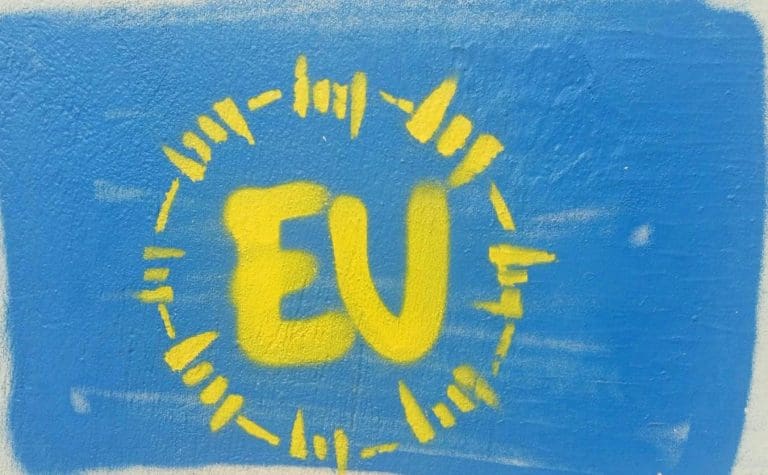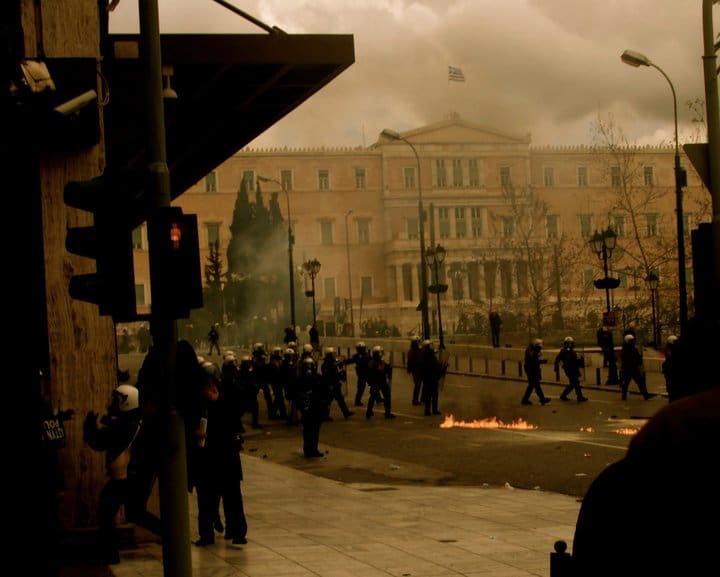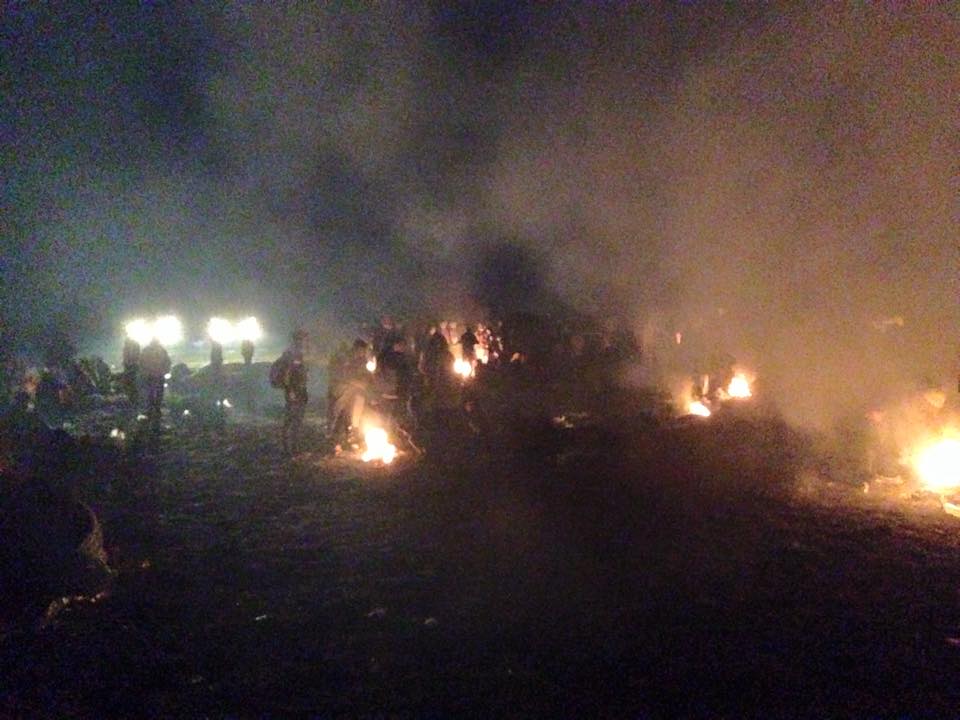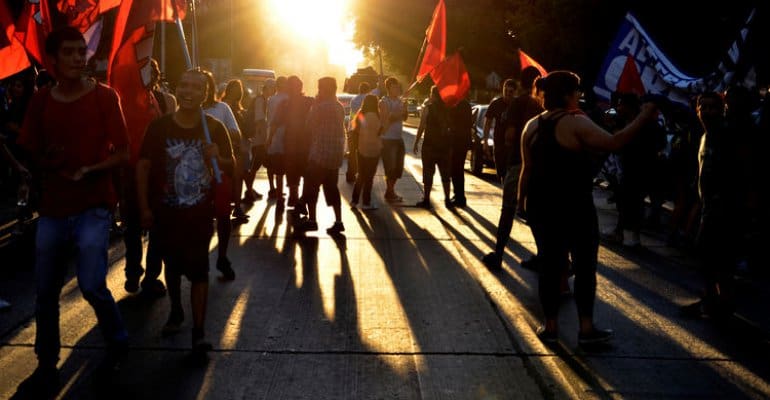AntiNote: State repression of aid workers and solidarity activists amid the ongoing border crisis in Europe has been making headlines of late. It is far more widespread than simply these more prominent cases, however, and has also been going on ever since the 2015 “summer of migration” produced the massive autonomous humanitarian effort that members of our writers collective participated in and have covered extensively in these pages.
This effort, which drew volunteers and activists from all over the world and also included many people who are themselves refugees, ended up throwing the inhumanity and violence of authoritarian, nationalist, and capitalist state power into stark relief in ways that seemed to catch many off guard. People with experience directly challenging or threatening this power through their actions or their very identities were not so surprised, perhaps, but others seemed not to have expected that their nonviolent, autonomous humanitarian activities would be regarded as the same kind of challenge or threat to be controlled, co-opted, or repressed in the same manner.
The good news is that this shock has radicalized many people and forced painful realizations about the structures that govern all of our lives, and about the immense violence that is required to maintain these structures and the intolerable inequalities they produce.
This article, which appeared in an online student newspaper last month, is a heartening example of this process on display. We have added some hyperlinks to groups involved in organizing support for the Moria 3 (the third activist not mentioned is Nassos Karakitsos), for readers interested in offering theirs. There are also rallies planned for this Saturday, 20 October 2018, in Berlin, Dublin, London, Stockholm, and Boston. Check one out if you’re in the neighborhood.
Yes, Sara Mardini Is Still in Prison for Saving Refugees, and So Is Seán Binder
by Elena Gagovska for the Bärliner (ed.: Margarethe Hattingh)
22 September 2018 (original post)
My summer was filled with editing work for Joshua Dubler and Vincent Lloyd’s forthcoming book on prison abolition, so I’ve been thinking a lot about who the prison system criminalizes and what justice means in the framework of that system. Then the school year began with news of the arrests of two activists, one of whom is a fellow student here at Bard College Berlin (BCB).
I found out about the arrests of Sara Mardini and Seán Binder when other activists I know from Berlin contacted me about the news a day before the BCB press release was sent out to all students. The situation was obviously concerning, but it was encouraging that people who are not from the school had heard about it and wanted to take action. The fact that their story was getting attention was comforting; at least the world wasn’t ignoring Sara and Seán, which is always a question when it comes to political imprisonment. But because we live in a world of short media cycles, the spotlight won’t last long enough to help them get out of jail unless we agitate to keep it on them.
I am studying humanities, not law, but it was immediately clear to me what role my fellow students and I need to play in this situation. Unlike Sara and Seán’s lawyers, we are not here to provide the legal arguments, but rather the moral ones for their release. It is up to us to help tell Sara and Seán’s stories and to keep getting people to listen to and care about them.
Sara and Seán worked with an aid group called Emergency Response Center International (ERCI) on the Greek island of Lesbos this past summer, part of a group of volunteers who provided arriving refugees with blankets, made sure the kids were alright, and gave first aid help when necessary. As an Arabic speaker, Sara was also working in a camp clinic as a coordinator and translator. Since Lesbos is one of the main entry points for refugees to Europe, they certainly had their hands full. However, instead of being applauded for their work, they were arrested.

Sara and Seán’s story was quickly covered by the media and their actions were portrayed in both positive and negative lights. Regardless of the spin on their stories, the fact is that they have been accused—though not (yet) legally charged—with human trafficking, membership in a criminal organization, money laundering, and espionage. At the time of writing, both of them have been in prison for four weeks, awaiting trial. This may take up to eighteen months or even longer—not to mention that the charges are unsubstantiated, and false. “The accusations are more about criminalizing humanitarian action,” Sara’s lawyer said, quoted in the Guardian. “Sara wasn’t even here when these alleged crimes took place, but, as charges they are serious—perhaps the most serious any aid worker has ever faced.”
The decision to keep them in prison until their trial is absolutely outrageous and the fact that the allegations against them are not substantiated makes the whole situation even more absurd and infuriating.
People who are concerned about Sara and Seán have activated diplomatic channels. The German and Irish embassies were both contacted, as Sara is a Syrian refugee who has residential status in Germany and Seán is a German citizen who has lived in Ireland since the age of five. At first, Seán’s mother, Fanny Binder, felt that she had not been getting adequate assistance from either German or Irish officials, but things have thankfully changed.
“Seán and I are now in contact with the German embassy, and a representative will come to see him in Chios very soon,” Fanny told me. “Members of the Irish embassy in Greece and the Irish government have promised to keep an eye on the situation—even though it is more difficult for them to help, as Seán is only a resident, not a citizen, of Ireland.”
Institutional support from government bodies is, of course, important as a way to exert international pressure on the Greek authorities to release Sara and Seán. Support has also come from sixty NGOs that signed on to a statement issued by the We Are a Welcoming Europe campaign. In this statement they urge the release of the two volunteers, writing: “The arrest of Sara Mardini and Seán Binder is the latest case of a worrying trend towards the criminalization of solidarity in Europe.”
Members of Theater X, a Berlin-based youth theater troupe that Sara was a part of, have also reached out to BCB and want to help. They are interested in making a performance art piece about Sara that would tell her story and would potentially be a part of demonstrations regarding her and Seán’s case.
BCB and other concerned parties have also been in contact with various media outlets to cover Sara and Seán’s story; the Guardian, the Independent, ZDF and others have written and broadcasted on the topic. But this sort of coverage won’t last forever if the situation remains unchanged: with Sara and Seán stuck in prison awaiting trial, the media will lose interest in their story.
We have decided to organize a demonstration in Berlin, and Seán’s friends have been in contact with us about organizing a similar demonstration in Ireland on the same date. Seebrücke, an international solidarity movement for refugees, contacted BCB offering support in helping keep the media spotlight on Seán and Sara as well. Bringing further international attention to their case will keep pressure on the Greek government for their release.
I am glad that the effort to free humanitarians has been met with support from many parties. There is something especially beautiful about international efforts and the solidarity they engender. But, even more importantly, international organizing has proven to be historically effective. It took globally coordinated efforts to free political prisoners like Angela Davis and Nelson Mandela. It is international pressure of a horizontal nature that resulted in authorities making legal decisions they otherwise would not have made.
When one of the biggest and most polarizing issues of our time is migration—particularly of non-white people—it is no wonder that immigrants, refugees, and those who help them have become criminalized. Rightwing movements constantly blame the influx of immigrants and refugees for economic problems caused by a flawed economic system. Anti-immigrant and anti-refugee sentiment has become such a mainstream view, due to the scapegoating of these communities, that their humanity has been put up for debate. In such an extreme political climate, Sara and Seán’s arrests fit in perfectly with Greece’s national scare campaign to discourage young potential volunteers from joining local NGOs, as well as with the broader narrative of European rightwing movements emphasizing the supposed illegality of seeking asylum. Under no circumstances should we become accustomed to such actions or accept this situation as normal.
We must go back and learn from history in times as dire as these. We must mobilize and create international pressure in a similar way to activists of previous generations. We must do everything we can to free the political prisoners of our time.
How, exactly? Besides the methods mentioned above, I initially thought I could help Sara and Seán in a simple and direct way: by giving them a platform. Despite having received so much media attention, at no point have they been able to speak for themselves. They ought to have control over their own narratives as well as the space to speak about their experiences themselves, I thought.
So when Fanny Binder told me that she had seen Seán in prison, I asked if she would send him some questions I had for him, and she said she’d try. I asked questions like: “Your father was a Vietnamese refugee who came to Germany after the Vietnam War. How do you think this personal history has affected the way you see and engage in refugee politics?” and “Are you getting support from the other prisoners? Do you consider yourself and Sara to be political prisoners?”
Fanny informed me that Seán enthusiastically answered my questions—however, his lawyer had advised the family against speaking publicly about his imprisonment before the trial, as it might impact his chances of getting released, so she preferred not to transmit his responses. I was disappointed. The answers to these questions were important to me not just from a journalistic point of view; after having become so involved in Sara and Seán’s case I wanted to get to know at least one of them personally.
Still, I can’t blame Fanny, Seán, or his lawyer for this decision. It made me realize that I had overlooked certain crucial things about incarceration: when someone is incarcerated, even if they have not yet been found guilty of anything, certain rights and privileges disappear from their lives.
“Now, four weeks into his detention, Seán is finally able to go outside, and he is very grateful for this,” Fanny told me.

It is obvious that prisons take away prisoners’ right to freedom of movement, but I had never considered the full extent to which they can do so. Unlike his movement, Seán’s speech is not literally restricted by law or police. But the self-policing he has to perform is nonetheless coerced and is, in some sense, of an even more sinister nature. He is a prisoner; people in the judiciary have nearly untrammeled power over his fate. In theory, the law should prevail: if he has done nothing illegal, he should be released. But in practice, even though Sara and Seán haven’t been found to have done anything illegal, they could both remain in detention for months or years and have to feel “grateful” that the Greek prison system has graced them with limited time outside.
Especially after working on Dubler and Lloyd’s forthcoming book, I have come to understand that we tend to conflate the criminal justice system with justice itself. This is a fundamental misapprehension. People who end up in prison are very often not the evil murderers and rapists that we imagine them to be. Instead, much more often than not, they are part of disadvantaged classes: they are poor, they are people of color, they are immigrants and refugees. And because of the repressiveness of the prison system, we do not get to hear from prisoners, which leads us to the default belief that they must just be “bad people” who deserve to be punished—rather than human beings who have simply made mistakes or are even entirely innocent and wrongfully imprisoned.
Neither Sara nor Seán can speak for themselves, not when the institutions of justice don’t allow it, and not when speaking for themselves could lead to a more prolonged incarceration. Sara and Seán cannot make the claim that they are political prisoners. But I can. People who know them can. And activists who do not know them can. It turns out that sometimes we do have to speak on behalf of the incarcerated, loath though we may be to speak for anyone.

Long term prison-abolitionist (or even -reformist) strategies are not necessarily the same strategies that one might use to help free individual prisoners in the short run. But in Sara and Seán’s case as in any other, it is important that we have critiques of the oppressive nature of prisons in mind while thinking about the specificity of their context. While I can share my account of why Seán could not speak freely (and if these sorts of critiques are made enough times, they may help prisoners in the long run), for now I am still not at liberty to publish his story in his own words. This simply means that our resistance has to be smart. We should continue fighting so that Sara, Seán and all political prisoners eventually get to tell their own story.
For now it will have to suffice to share some of what people who know Sara and Seán well have had to say about them and their work:
“Being the Sara which our collective has come to know and love,” says Ahmed Shah, the artistic director of Theater X and Club al-Hakawati, “she decided to leave the comfort of her newfound home in Berlin as well as her friends and colleagues in our club and our theater in order to return to the borders of Fortress Europe—after having faced the threat of perishing in the sea and landing dead on its shores herself—to actively help all those hoping for a safe and better life.
“I hope that she and many brave women and men like her will be freed,” Ahmed continues, “and that the brutality of the European regimes will finally be stopped and become relics of the past. That is why we at Theater X all say: Free Sara now!”
A fellow BCB student, Aziza Izamova, recounts the start of her friendship with Sara: “I knew about Sara before we met. In August 2017 during a welcome dinner for freshmen, two women were talking next to me, and I heard some chunks of conversation like ‘I am a swimmer…a refugee…my sister Yusra is also a swimmer.’ I literally interrupted her with something like: ‘Hold on, I think I read an article about you in a goddamn magazine.’
“Now that I’ve gotten to know Sara,” says Aziza, “I can say that she is really protective of other people. I think she has always been like this; it’s not that her life journey shaped her this way, but she is so strong by herself that she overcomes challenges. And she continues to do so.”
“Seán grew up in County Kerry about five minutes from my own home,” recalls Rowan Copeland, a childhood friend. “We’ve been friends since the age of five. When he first moved to Ireland he had no English and, being a five-year-old, I didn’t have any German. But we managed to strike up a friendship from the word go.
“Former teachers, coaches, and everyone who knows Seán were absolutely shocked to hear about his arrest. The Seán we all know is a good soul and a kind, generous person. When I first heard about the charges imposed on Seán, I remembered him telling me about Lesbos and how he gave his own boots to a migrant to help them traverse rocks and rough ground. There’s no better way to describe Seán’s attitude to life than that.”
“Sara was a coworker of mine in the context of Theater X,” says Dinah Büchner. “She was part of the theater collective Club al-Hakawati. More specifically, she was an actress and also one of the people managing the group’s activities.
“I remember when I saw her on stage for the first time, on the really small stage of Theater X. The entire room fell silent as she started telling the story of her long way to Germany. She wore a white Hakawati robe and had this captivating way of talking to the audience. The story seemed like it wasn’t real, but you could feel it was all true—how she and her sister saved all those people on their rubber boat as they crossed the Mediterranean. She had that radiating energy that made people hold their breath.
“She invested so much passion and energy in the refugee struggle,” Dinah concludes, “and never lost sight of what she was fighting for: freedom of movement, the right to stay. She embodied the slogan of Club al-Hakawati: ‘Nobody gives us a voice—we take it!’”
Finally, Seán’s mother Fanny: “I try to be hopeful all the time. It’s very encouraging that we have an amazing network of support all over the world. But Sara’s and Seán’s freedom is still taken away from them and we have to do all we can do to make sure a trial day is set immediately so they can prove their innocence and be freed.”
If they both agree to it, I would love to interview Sara and Seán when they get out of prison. Until then, I will do everything I can so that sooner rather than later they are able to tell their stories—both about their humanitarian work as well as their incarceration—themselves.
Elena Gagovska has written another article following her experience at the massive antifascist demonstration in Berlin last weekend, of which the migrant justice and refugee rights movements were a major part. It is also a call-up for this weekend’s #RescueTheRescuers demonstrations. Recommended to read and share widely!
Featured image source: Free Humanitarians via the Bärliner

